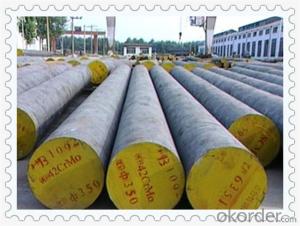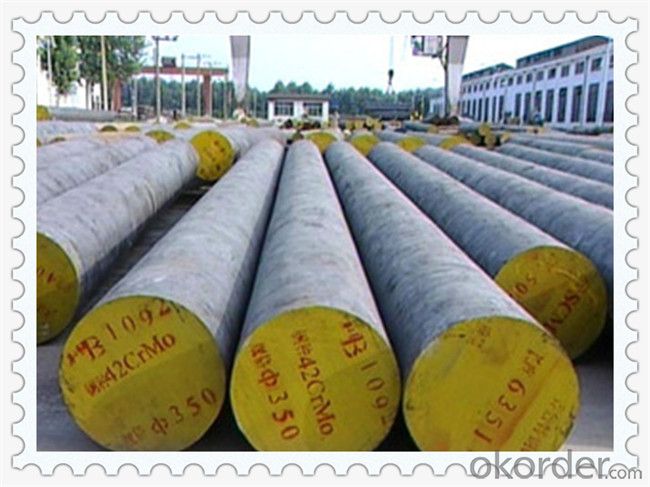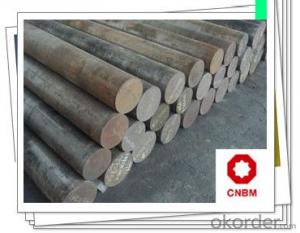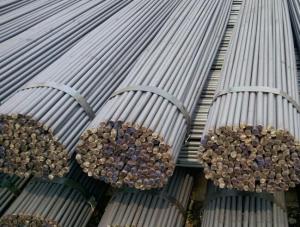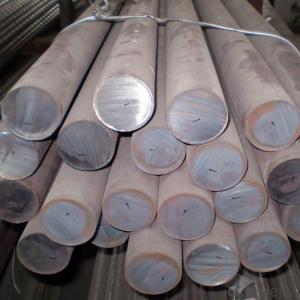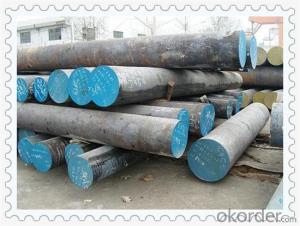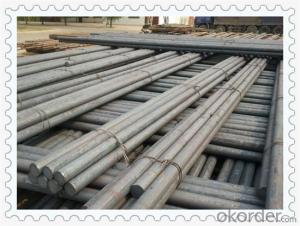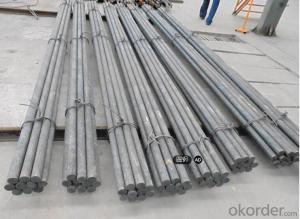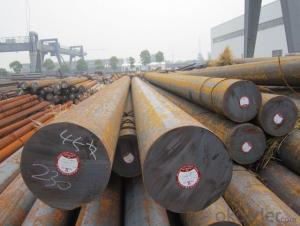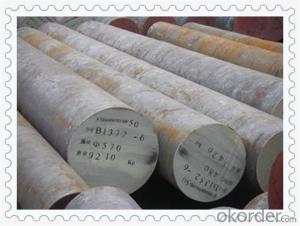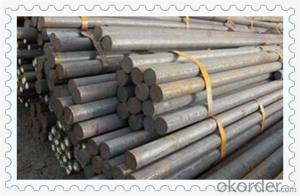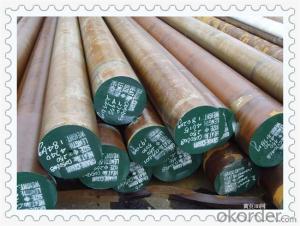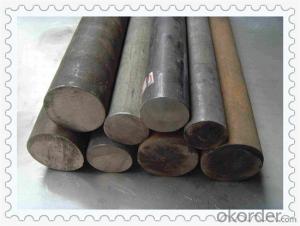AISI 1008 Carbon Steel Round Bars
- Loading Port:
- China main port
- Payment Terms:
- TT OR LC
- Min Order Qty:
- 30 m.t.
- Supply Capability:
- 10000 m.t./month
OKorder Service Pledge
OKorder Financial Service
You Might Also Like
AISI 1008 Carbon Steel Round Bars
Technical Paramenters
Diamater: Ø12mm-Ø650mm
Length: standard 6m,9m,12m, If you need special lengths,please call us.
Surface: Black, polished, grinded
Process: Hot rolled,cold drawn,forged
Inspection: UT test, mill test certificate, third party inspection such as SGS,BV etc.
Packing: In bundle, tied by steel straps, covered with protecting film
Use wooden box, fill with foam to keep the surface from damaging
Description | 1008 steel rould bar | |
Material | ASTM /AISI | 1005,1006,1008,1010,1015,1020,1025,1030,1035, 1040,1045,1050,1055,1060,1065,1070,1080,1084 |
DIN | Ck10,Ck15,Ck22,Ck25,Ck30,Ck35,Ck40,Ck45,Ck50, 30Mn4,40Mn4 | |
Standard | GB/T799,ASTM A29,A36,A108,A321,A575,BS970,DIN1652,JIS G4051 | |
Section shape | Round Other shape such as square,hexagonal,flat,angle | |
Surface | Black, galvanized,grinded, | |
Specifications | Round bar | Diameter: 12mm~650mm |
Angle bar | Size: 3mm*20mm*20mm~12mm*800mm*800mm | |
Square/ bar | Size: 4mm*4mm~100mm*100mm | |
Flat bar | Thickness: 2mm~100mm | |
Width:10mm~500mm | ||
Hexagonal | Size: 4mm~800mm | |
Length | Standard 6m,9m,12m or as required. | |
Trade terms | Payment terms | T/T,L/C,Western Union |
Price terms | FOB,CIF,CFR,EXW | |
Applications | Steel round bar is widely used for all general fabrication and repairs in industrial maintenance, agricultural implements, transportation equipment, ornamental work frame work, braces, supports, shafts,axels,etc. Hot rolled Steel round bars have a slightly grain textured finish. | |
Products Show
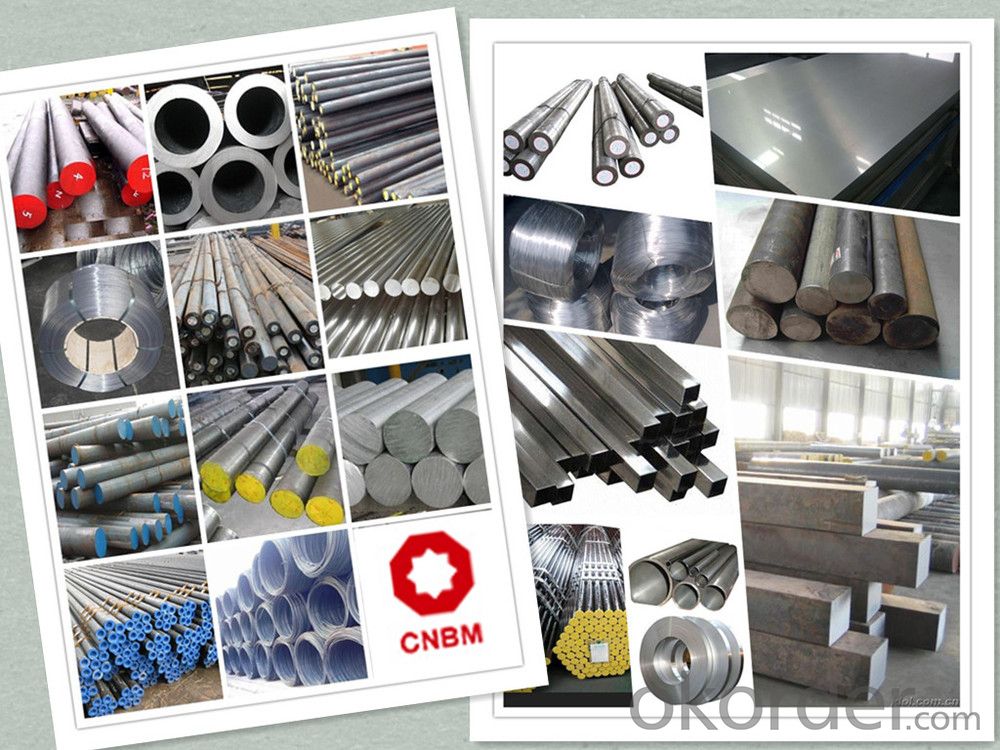
Product Overviews
| Product Name | Typical Grades | Diameter(mm) | Standard adopted |
| Carbon Steel | 20 (1020/S20C/C22) | Ø16-Ø300 |
GB/SAE/JIS/DIN
|
| 40 (1040/S40C/C40) | |||
| 45 (1045/S45C/C45) | |||
| Bearing Steel | GCr9 (51100/SUJ1) | Ø12-Ø250 | |
| GCr15 (52100/SUJ2/100Gr6) | |||
| GCr9SiMn (A485-Gr.1/SUJ3) | |||
Cr-Mo Steel | 20Cr (5120/SCr420H/20Cr4) | Ø12-Ø250 | |
| 40Cr (5140/SCr440/41Cr4) | |||
| 42CrMo(4140/SCM440/42CrMo4) | |||
| Gear Steel | 20CrNiMo | Ø16-Ø600 | |
| 20CrMn(5115/SMnC420/20MnCr5) | |||
| 20CrNiMo(8620/SNCM220/20CrMiMo2) |
Application
| Carbon Steel | Mold bottom, Plastic mold, Construction machinery parts Automobile parts, Security grills, Screens, Construction |
| Bearing Steel | Aerospace, Navigation, Nuclear energy, Chemical industry Electronic information, Petrochemical, Instrument and meter Transportation |
| Cr-Mo Steel | Mechanism & Fasteners gear, Stressed components for vehicles Engines and machines, Parts of larger cross-section |
| Gear Steel | All kinds of gears, Statically and dynamically stressed component for vehicles Engines and machine, Larger cross-section parts, Crankshafts |
Work Shop
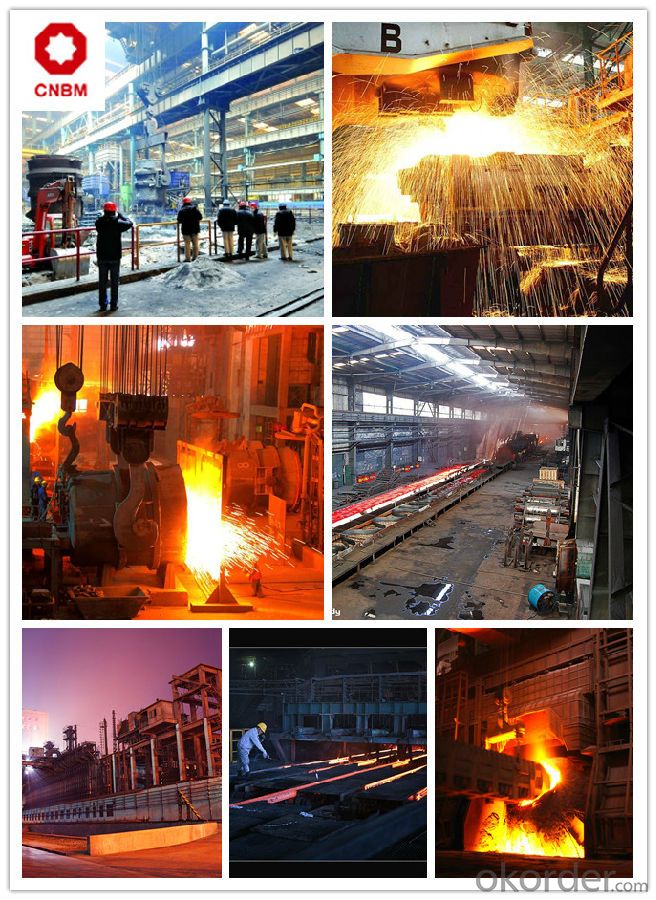
Company Information
CNBM International Corporation is the most important trading platform of CNBM group.
Whith its advantages, CNBM International are mainly concentrate on Cement, Glass, Iron and Steel, Ceramics industries and devotes herself for supplying high qulity series of refractories as well as technical consultancies and logistics solutions.

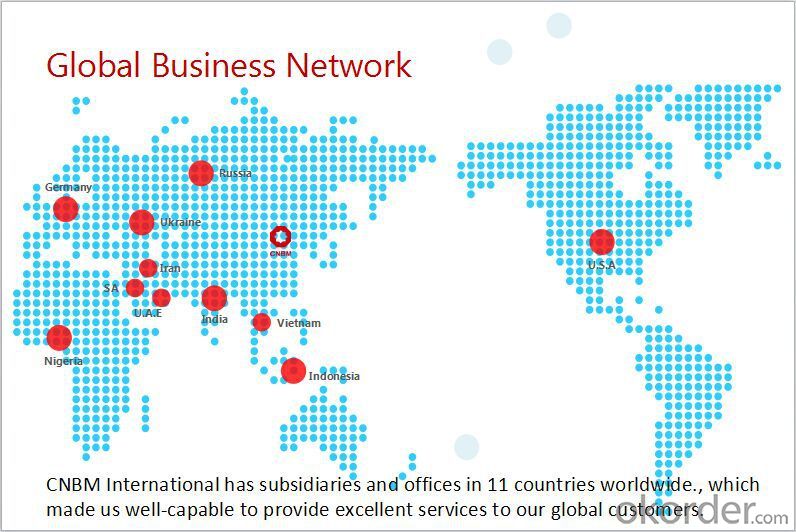
FAQ
1, Your advantages?
professional products inquiry, products knowledge train (for agents), smooth goods delivery, excellent customer solution proposale
2, Test & Certificate?
SGS test is available, customer inspection before shipping is welcome, third party inspection is no problem
3, Factory or Trading Company?
CNBM is a trading company but we have so many protocol factories and CNBM works as a trading department of these factories. Also CNBM is the holding company of many factories.
4, Payment Terms?
30% TT as deposit and 70% before delivery.
Irrevocable L/C at sight.
5, Trading Terms?
EXW, FOB, CIF, FFR, CNF
6, After-sale Service?
CNBM provides the services and support you need for every step of our cooperation. We're the business partner you can trust.
For any problem, please kindly contact us at any your convenient time.
We'll reply you in our first priority within 24 hours.
Packaging & Delivery
1, Packaging: seaworthy package or as required
2, Delivery: 35-45 days or based on quantity
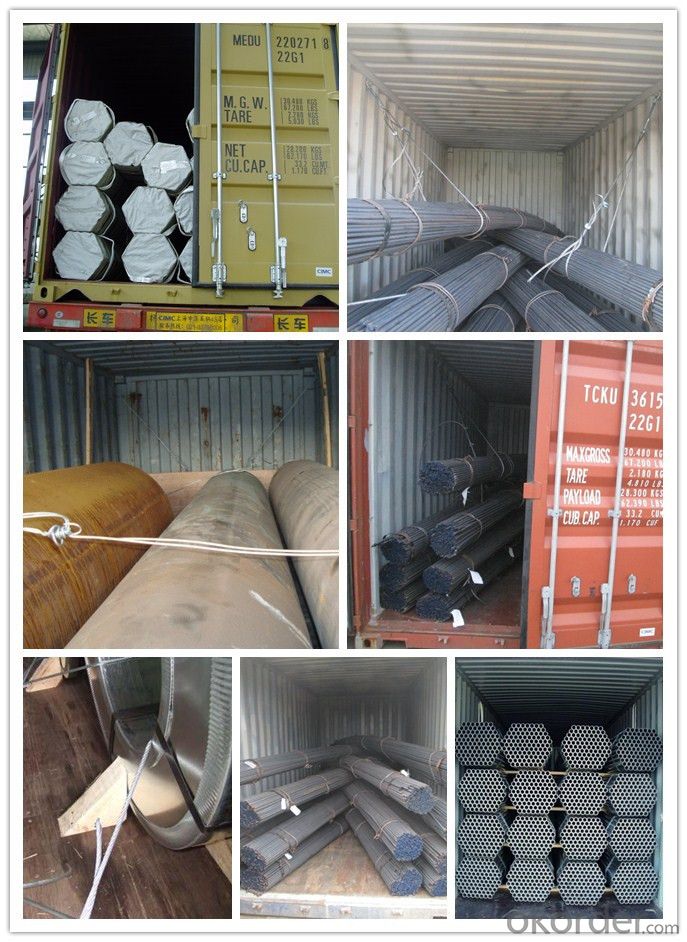
- Q: What are the different heat treatment processes for steel round bars?
- There are several heat treatment processes for steel round bars, including annealing, normalizing, quenching, tempering, and hardening. Annealing involves heating the steel to a specific temperature and then slowly cooling it to relieve internal stresses and improve its machinability. Normalizing is a similar process, but the cooling is done in still air to achieve a more uniform structure. Quenching involves rapidly cooling the steel from a high temperature to increase its hardness, while tempering is a subsequent process that reduces the brittleness caused by quenching through controlled reheating. Hardening is a process that involves heating the steel to a high temperature and then rapidly cooling it to achieve maximum hardness.
- Q: Can steel round bars be used in the renewable energy industry?
- Yes, steel round bars can be used in the renewable energy industry. They are commonly used in the construction of wind turbine towers, solar panel structures, and hydroelectric power systems. Steel round bars offer high strength, durability, and resistance to corrosion, making them suitable for supporting and securing various renewable energy infrastructure components.
- Q: How do steel round bars compare to wrought iron bars?
- Steel round bars and wrought iron bars have several differences that set them apart. Firstly, steel round bars are made from an alloy of iron and carbon, whereas wrought iron bars are composed of pure iron with a low carbon content. This difference in composition leads to varying properties. Steel round bars are known for their strength and durability, making them suitable for a wide range of applications, including construction, manufacturing, and engineering. On the other hand, wrought iron bars are softer and more malleable, allowing them to be easily shaped and formed into intricate designs. This characteristic makes wrought iron bars popular in decorative applications such as gates, fences, and ornamental pieces. Another difference lies in their manufacturing processes. Steel round bars are typically produced through hot rolling, which involves heating the steel billet and passing it through a series of rollers to shape it into the desired round bar form. In contrast, wrought iron bars are made through a labor-intensive process called blacksmithing. This involves heating the iron and repeatedly hammering it to remove impurities and create a fibrous structure, resulting in its characteristic grainy appearance. In terms of cost, steel round bars are generally more affordable compared to wrought iron bars. The manufacturing process for steel is more streamlined and efficient, leading to lower production costs. Wrought iron bars, on the other hand, require more time and labor, making them more expensive. Finally, when it comes to corrosion resistance, steel round bars have an advantage. Steel can be further alloyed with elements such as chromium, nickel, and molybdenum to enhance its resistance to rust and corrosion. This makes steel round bars suitable for outdoor applications where they may be exposed to moisture and harsh environmental conditions. Wrought iron bars, although they possess some level of corrosion resistance, are more prone to rusting and require regular maintenance to prevent deterioration. In conclusion, steel round bars and wrought iron bars differ in terms of composition, strength, manufacturing process, cost, and corrosion resistance. The choice between the two will depend on the specific requirements of the application, with steel round bars being favored for their strength and affordability, while wrought iron bars are often chosen for their malleability and decorative appeal.
- Q: How do you prevent rusting of steel round bars?
- There are several effective measures that can be taken to prevent rusting of steel round bars: 1. Application of a protective coating is a common method to prevent rusting. This can be done using paint, varnish, or a specialized rust-preventive coating. The coating acts as a barrier, blocking moisture and oxygen from reaching the metal and causing rust. 2. Keeping the steel dry is crucial as moisture is a key factor in corrosion. It is important to store the steel round bars in a dry environment or use dehumidifiers in areas with high moisture levels. 3. Proper ventilation is essential to prevent moisture accumulation around the steel round bars. Good air circulation allows any present moisture to evaporate, reducing the risk of rust formation. 4. Rust inhibitors, also known as corrosion inhibitors, can be applied to the steel round bars. These inhibitors chemically react with the metal surface, forming a protective layer that inhibits oxidation. They can be in the form of oils, waxes, or specialized compounds. 5. Storing the steel round bars in a controlled environment is important if they are not immediately being used. This means keeping them in a dry, temperature-controlled area to minimize exposure to moisture and extreme temperatures, both of which can accelerate rust formation. 6. Regular maintenance and inspection are advisable. It is important to regularly check the steel round bars for rust or damage. Any rust spots should be promptly cleaned and treated with a rust remover or inhibitor to prevent further corrosion. By following these preventive measures, the rusting of steel round bars can be significantly reduced, ensuring their longevity and maintaining their structural integrity.
- Q: What are the different types of steel round bar surface treatments used in the aerospace industry?
- In the aerospace industry, there are several types of steel round bar surface treatments that are commonly used to enhance the performance and durability of the materials. These treatments are specifically designed to meet the stringent requirements and standards set by the industry. Some of the different types of steel round bar surface treatments used in the aerospace industry include: 1. Passivation: This treatment involves the removal of iron particles and other contaminants from the surface of the steel round bar. It helps to prevent corrosion and improves the overall corrosion resistance properties of the material. 2. Shot Peening: Shot peening is a process that involves bombarding the surface of the steel round bar with small metallic shots. This treatment induces compressive stress on the surface, which enhances the material's fatigue strength and resistance to stress corrosion cracking. 3. Electroplating: Electroplating is a common surface treatment used in the aerospace industry. It involves the deposition of a layer of metallic coating onto the steel round bar through an electrochemical process. This treatment enhances the material's corrosion resistance, wear resistance, and aesthetic appearance. 4. Anodizing: Anodizing is an electrolytic passivation process that is commonly used on aluminum alloys. However, it can also be used on steel round bars. This treatment forms a thick, durable, and corrosion-resistant layer of oxide on the surface, which improves the material's resistance to wear, corrosion, and scratching. 5. Nitriding: Nitriding is a surface hardening treatment that involves the diffusion of nitrogen into the surface of the steel round bar. This treatment improves the material's surface hardness, wear resistance, and fatigue strength. 6. Chemical Conversion Coating: Chemical conversion coating is a treatment that involves the formation of a thin, protective layer on the surface of the steel round bar. This coating enhances the material's corrosion resistance and provides a good base for subsequent paint or coating applications. These are just a few examples of the different types of steel round bar surface treatments used in the aerospace industry. Each treatment offers unique benefits and is selected based on the specific requirements of the application, such as corrosion resistance, wear resistance, fatigue strength, and aesthetic appearance.
- Q: Can steel round bars be used in the production of fasteners?
- Yes, steel round bars can be used in the production of fasteners. Steel round bars can be machined, threaded, and cut to the required length to create various types of fasteners, such as bolts, screws, and studs. The strength and durability of steel make it an ideal material for fasteners that need to withstand high loads and provide secure fastening in various applications.
- Q: What is the weight of a steel round bar?
- The weight of a steel round bar depends on its dimensions, specifically its diameter and length. To calculate the weight, you can use the formula: weight = volume × density. To find the volume of the steel round bar, you can use the formula for the volume of a cylinder: volume = π × (diameter/2)^2 × length, where π is a mathematical constant approximately equal to 3.14159. The density of steel varies depending on the type and grade, but it is typically around 7.85 grams per cubic centimeter (g/cm³) or 7850 kilograms per cubic meter (kg/m³). By substituting the appropriate values into the formula, you can calculate the weight of the steel round bar in the desired unit (grams, kilograms, pounds, etc.).
- Q: What are the different testing methods for steel round bars?
- Steel round bars undergo various testing methods to assess their quality and performance. These methods encompass: 1. Tensile Testing: This method determines the strength and elasticity of steel round bars by subjecting them to force until they fracture. It measures the maximum load the bars can endure, helping ascertain their ultimate tensile strength, yield strength, and elongation. 2. Hardness Testing: To evaluate the resistance of steel round bars against indentation or scratching, hardness testing is employed. It includes tests like Rockwell, Brinell, and Vickers, which provide insights into the material's ability to withstand wear, deformation, and surface damage. 3. Charpy Impact Testing: This testing measures the toughness and resistance to brittle fracture in steel round bars. It involves striking notched samples with a pendulum and measuring the energy absorbed during fracture. This test is vital in assessing the material's behavior under sudden impact or dynamic loading scenarios. 4. Ultrasonic Testing: High-frequency sound waves are utilized in this non-destructive testing method to detect internal flaws or defects in steel round bars. It identifies cracks, inclusions, or voids that might compromise the material's structural integrity. 5. Magnetic Particle Inspection: This method identifies surface cracks or defects in steel round bars by magnetizing the material and applying iron particles or magnetic ink. Any cracks or flaws cause a leakage of magnetic flux, making them visible under suitable lighting conditions. 6. Visual Inspection: This basic yet essential method involves visually examining the surface of steel round bars for any visible defects such as pits, scratches, or irregularities in shape or dimensions. 7. Chemical Analysis: By analyzing the composition of steel round bars and measuring the percentage of various elements present, chemical analysis ensures that the material meets required specifications and is suitable for its intended application. In summary, a combination of these testing methods is employed across industries like construction, manufacturing, and engineering to guarantee the quality, performance, and reliability of steel round bars.
- Q: Can steel round bars be used for drive shaft applications?
- Drive shaft applications can indeed utilize steel round bars. These drive shafts play a crucial role in transferring torque and rotational motion from the engine to the wheels or other components found in a range of mechanical systems, such as cars, industrial machinery, and even boats. Steel round bars possess exceptional mechanical properties that are vital for withstanding the stresses and loads experienced during operation. These properties include high strength, durability, and toughness. Additionally, they display good fatigue resistance, enabling them to withstand repeated loading cycles without succumbing to failure. Moreover, steel round bars can be accurately machined to meet the required dimensions and tolerances for drive shaft applications. They can also be subjected to heat treatment to enhance their strength and hardness, or surface treatment to improve corrosion resistance, if necessary. In conclusion, steel round bars are a favored choice for drive shaft applications due to their combination of strength, durability, and machinability. This makes them highly suitable for efficiently and reliably transmitting power in various mechanical systems.
- Q: What are the advantages of using nickel-chromium-molybdenum alloy steel round bars?
- There are several advantages of using nickel-chromium-molybdenum alloy steel round bars: 1. High strength and durability: Nickel-chromium-molybdenum alloy steel round bars have excellent mechanical properties, including high tensile strength and hardness. This makes them ideal for applications that require a strong and durable material. 2. Corrosion resistance: The addition of nickel and chromium in the alloy steel composition enhances its resistance to corrosion, making it suitable for use in environments where exposure to harsh chemicals or moisture is a concern. This corrosion resistance extends the lifespan of the round bars and reduces the need for frequent replacements. 3. Heat resistance: Nickel-chromium-molybdenum alloy steel round bars can withstand high temperatures without losing their structural integrity. This makes them suitable for applications that involve exposure to extreme heat, such as in the manufacturing of boilers, heat exchangers, and other heat-resistant equipment. 4. Versatility: The nickel-chromium-molybdenum alloy steel round bars can be easily machined and fabricated, allowing for various shapes and sizes to be produced. This versatility makes them suitable for a wide range of applications in industries such as aerospace, automotive, oil and gas, and construction. 5. Fatigue resistance: The alloy composition of nickel-chromium-molybdenum steel enhances its fatigue resistance, making it suitable for applications subjected to cyclic loading or repeated stress. This property ensures that the round bars can withstand prolonged use without experiencing fatigue failure. 6. Weldability: Nickel-chromium-molybdenum alloy steel round bars have good weldability, allowing for easy joining or fabrication processes. This makes them suitable for applications that require welding or other forms of joining, providing flexibility in design and construction. Overall, the advantages of using nickel-chromium-molybdenum alloy steel round bars make them a preferred choice in various industries where strength, durability, corrosion resistance, heat resistance, versatility, fatigue resistance, and weldability are crucial factors for success.
Send your message to us
AISI 1008 Carbon Steel Round Bars
- Loading Port:
- China main port
- Payment Terms:
- TT OR LC
- Min Order Qty:
- 30 m.t.
- Supply Capability:
- 10000 m.t./month
OKorder Service Pledge
OKorder Financial Service
Similar products
Hot products
Hot Searches
Related keywords
